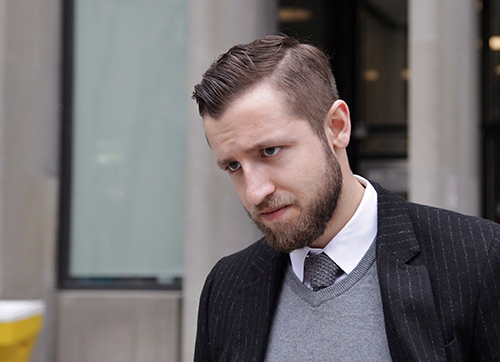On February 6, VICE News reporter Ben Makuch is due to appear in court to appeal an order requesting that he hand over details of his communication with a source. The hearing comes ahead of a day of action being planned in Canada for February 25, when press freedom and privacy activists are due to lobby the government over issues including surveillance powers and an anti-terrorism bill.
As well as the legal action against Makuch, news outlets reported in 2016 that police had issued warrants to spy on at least eight journalists, checked phone records to see if officers had been in contact with journalists, and seized a journalist’s laptop. Authorities also called for increased police surveillance powers and criticized encryption for hampering police work.
CPJ has documented these incidents in a Knight TimelineJS, which can be viewed here:
“There’s been a series of very serious press freedom violations,” Duncan Pike, campaigns and advocacy coordinator for press freedom organization, Canadian Journalists for Free Expression (CJFE), told CPJ. “Underlying all of this is the general threat to press freedom we see from national security laws.”
Last week, CJFE released details of a nationwide poll that showed three-quarters of the 2,316 Canadians surveyed wanted a national inquiry into police surveillance of journalists and 70 percent said they would support a shield law to protect journalists from search warrants or from being compelled to give up their sources in court.
In Makuch’s case, the Ontario Superior Court ordered the reporter in March 2016 to hand over all of the communication he had with Farah Shirdon, a Canadian who police allege traveled to Syria to join the militant group Islamic State. In a statement filed to the court of appeals, Vice Media argued that Makuch’s messages on the Kik messaging app constituted his work product and said that subpoenaing them could have a chilling effect.
“My sources are talking to me about all these things in confidence and they don’t expect that I’m going to turn over every single piece of it to the authorities. I think that it is a really, really dangerous thing [the police are] doing and it actually baffles me that they’re not more concerned by it,” Makuch told CPJ. “The reason I have [the information] is because I’m a journalist. None of these people [will] talk to me if I were the [police] gathering evidence.”
As well as the legal action against Makuch, the Canadian media reported on several cases of journalists being targeted with warrants for surveillance, including Patrick Lagacé, a columnist for the newspaper La Presse.
Lagacé told CPJ that when one of his colleagues warned him that his name kept popping up in relation to a police investigation and that he might have been under surveillance, he dismissed it as “far-fetched.” The surveillance warrants for him were discovered when a prosecutor told a reporter for La Presse that at least one of the paper’s journalists had been under surveillance, the paper’s lawyer, Patrick Bourbeau, told CPJ. During a meeting with the paper, Montreal city police said that at least 24 warrants had been authorized to record Lagacé’s phone records, location, and the content of his calls with police officers during an investigation into internal whistleblowing, Bourbeau said.
Police have admitted to monitoring records of incoming and outgoing calls but they denied wiretapping calls, according to reports and Lagacé.
“It’s vulgar. It’s an obscene move in the sense that it is lazy police work. The Supreme Court of Canada has guidelines when it comes to raiding journalists’ homes, they can do it as a last resort but they have to go through every other means, that’s not what they did in this case,” Lagacé said. “This is not a national security issue. If it were I would not be less incensed, but I would understand their rationale. We are talking about someone suspected of leaking information to a journalist.”
Montreal police chief Philippe Pichet told a news conference on October 31 that the force was aware of the importance of press freedom but that police have a responsibility to investigate crimes involving officers, according to The Associated Press. He added that courts had approved the warrants.
In November, Quebec set up an inquiry commission following further reports that police put journalists under surveillance.
Montreal City Police told CPJ it was unable to comment on an ongoing investigation. Quebec provincial police did not immediately respond to CPJ’s request for comment.
Canadian Prime Minister Justin Trudeau described the surveillance as “troubling” but added, in a news conference in Ottawa in November, “We have actually strong safeguards and protections in place to protect the freedom of the press.”
Trudeau promised greater transparency during the 2015 national election campaign, but he has not yet endorsed a shield law (Bill S-231) introduced in parliament, and his party has not made any significant modifications to the Anti-Terrorism Act, 2015, passed by his predecessor Stephen Harper in June 2015. The act, known as C-51, expands the government’s powers to add individuals to a no-fly list and to share information between departments. It also authorizes judges to order internet service providers to remove content deemed to promote terrorism.
“Bill C-51 also broadens speech crimes to include advocating terrorism, but terrorist purpose is not required at all,” said Pike, whose organization CJFE opposed the law. “If a reporter interviews an [Islamic State] fighter and they give a platform [to that fighter] they could fall under ‘advocating or promoting terrorism.'”
At the end of last year, the Canadian government held a public consultation on national security law, which could include changes to C-51. The consultation did not lay out recommendations, but it emphasized the difficulty that police said they faced in investigating criminals. Privacy and press freedom organizations have released statements saying the consultation reads like an argument in favor of expansion of surveillance powers. A report based on the consulatation’s findings is due to be released in 2017, according to its website.
